|
SAMUEL
BAMFORD
(1788-1872)
Silk
weaver, radical, poet
and
participant in the
"Peterloo
Massacre" |
|
"The people
are born in masses, we may almost say; they live in masses; they work in
masses; they drink in masses; they applaud in masses; they condemn in
masses; they joy in masses; they sorrow in masses; and, as surely as that
Etna will vomit fire, they will, unless they be wisely and timely dealt
with, some day, act in masses.
"I do not undertake to say that here is a power capable alone, of
disarranging the present order of things; but I do say that I am of
opinion, that here, in time
will be found, mind sufficient to conceive, and will—aided by
circumstances—to give the first impulse to a movement, the like of which
has not been known
in England. These explosive elements—ever increasing—cannot be
continually tampered with, without producing their result."
Samuel Bamford
From....Walks in South Lancashire |
|
|
"Bamford is a brave, old, fighting soldier, who has borne the brunt of the
battle for much of the political liberty and social reform which we at
this day enjoy and accept as a matter of course, without reflecting that
other men have laboured, and we have entered into the fruit of their
labour."
Geraldine Endsor Jewsbury
――――♦―――― |
|
SAMUEL
BAMFORD—weaver, radical
and poet—was born at Middleton, Lancashire, on 28 February 1788. He
was the son of an operative muslin weaver, afterwards governor of the
Salford workhouse, and was educated at the Middleton and the Manchester
grammar schools. He learned weaving, and was later employed as a
warehouseman in Manchester; it was during this period that he made an accidental
acquaintance with Homer's Iliad and with the poems of Milton, and
his life was thenceforward marked with a passionate taste for poetry,
which brought forth fruit in the shape of several crude productions of
his own.
Bamford appears to have led a somewhat unsettled life in his
youth. He was for a short time a sailor in the employ of a collier
trading between Shields and London, he then
resumed his place in the warehouse and at length settled down as a
weaver. It was about this time that his first poetry appeared in print
and he became known in his district as one who had practical
sympathy with the difficulties of his class. Mrs. Gaskell, in her novel Mary
Barton, quotes a poem of his, beginning ‘God help the
Poor,’ to
illustrate the popularity of his verses with the Lancashire labouring
classes in their times of trial.
Resistance to trade oppression was the order of the day, and Bamford
went about with the endeavour to discover the true means of relief. He
had many of the peculiar talents necessary for the popular leader, while
averse to violence in any shape. He was brought into great public
notoriety on the occasion of that meeting of local clubs the dispersal
of which became known as the "Peterloo Massacre". It was
proved that Bamford's contingent to the meeting was peaceful and
orderly, and that his speech was of the same tendency. Yet he suffered
an imprisonment of twelve months on account of this affair. He
subsequently, by his personal influence alone, hindered the operations
of loom-breakers in South Lancashire. About 1826 he became correspondent
of a London morning newspaper, and having ceased to be a weaver by
employment, he incurred some dislike or distrust on the part of his old
fellow-workmen. Yet he always pleaded their cause as opportunity served,
even when, as a special constable during the Chartist agitation, he
incurred the downright enmity of his own class.
In 1851, or thereabouts, Bamford obtained a comfortable
situation—almost a sinecure, which raised above the prospect of want—as a messenger
for the Inland Revenue at Somerset House. But he became
dissatisfied with London life and people, and pined for his native
county; and after a few years of government employment he returned to his
old trade of weaving.
|
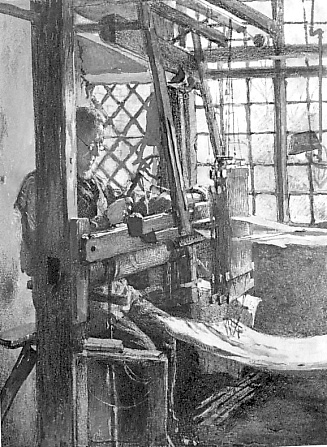
|
A LESSON FROM THE LOOM
AWHILE I watched my busy shuttle fly
Across the loom between the op'ning sheads;
And then I thought, e'en thus at my employ,
I may a useful lesson learn. Like threads
Our lives are woven in the web of time;
Our moments are the picks which pass between
The sheads. And if we make the woof sublime,
The piece, perchance, may please when it is seen
By the Great Master's ever-watchful eye;
And of His praise we each may get a share,
And His dear approbation yield in joy
A rich reward for all our toil and care.
And we may find that when life's piece is made
We all shall be by Him far more than paid!
David Lawton |
|
Hand-loom weaver. |
|
Samuel bamford died at Harpurhey, Lancashire, 13 April 1872, his last years having been provided for by the generosity of a few
friends. His public funeral was attended by thousands.
Bamford's fame rests both on his involvement in the history of radical politics and as a chronicler of social and political life in 19th Century
Lancashire. He was a prolific writer of leaflets and letters, as well as being a poet and a newspaper correspondent. His
autobiography, published in two volumes—'Passages in the Life of a Radical' (1839-41) and
'Early Days' (1848-49)—gives an authoritative and very readable account that reveals much of
the peasant way of life of the Lancashire artisan or craftsman in the
years immediately preceding the industrial era.
The high point of Bamford's involvement and influence in radical politics was between 1816 and 1821. The remainder of his long life—after
his quarrels with fellow radicals—is perhaps anticlimatic. His anti-Chartist attitudes and boundless egotism counted against him with many of his fellows.
Late in life he became increasingly cantankerous and jealous of his prestige as "the oldest living reformer" and as late as 1861 he believed government spies were keeping him under surveillance for his dangerous politics. By this time he had become one of "the prize platform bores of Lancashire political life", noting bitterly in his diary that someone else had been invited to give a lecture on parliamentary reform in Oldham Town Hall:
I was certainly much hurt to see that a young man, a young Parliamentary reformer, should be preferred to give a lecture on that subject whilst an old veteran like myself, who must have large knowledge of the subject from experience, and was on the verge of distress from want of encouragement in the way of lecturing, should be passed
by (May 13th 1861).
Despite this, Sam Bamford's early work is an important and accessible window on the 19th Century world.
|
|
Bibliography
Bamford's publications include:
-
An Account of the Arrest and Imprisonment of Samuel Bamford, Middleton, on Suspicion of High Treason,
1817;
-
The Weaver Boy, or Miscellaneous Poetry,
1819;
-
Homely Rhymes, 1843;
-
Passages in the Life of a Radical,
1840-4;
-
Walks in South Lancashire and on its Borders. With
Letters, Descriptions, Narratives and Observations Current and Incidental,
1844;
-
Tawk o'Seawth Lankeshur, by Samhul
Beamfort, 1850;
-
Life of Amos Ogden, 1853;
-
The Dialect of South Lancashire, or Tim Bobbin's Tummus and Meary,
with his Rhymes, with Glossary, 1854;
-
Early Days, 1849, 1859;
-
Homely Rhymes, Poems and
Reminiscences, 1864.
|
――――♦――――
|
"....Samuel Bamford, a man of Herculean mould, iron will, and indomitable
energy, whose 'Passages from the Life of a Radical' reveal the sufferings
he had endured, and the penalties he had incurred on behalf of his
political faith. He spoke his thoughts with fearless straightforwardness,
and was too earnest in all he said or did to study refinement in manner or
persuasiveness in speech. Underneath all this, however, there lay a gentle appreciativeness of all that was chaste and elevated in song or nervous in
composition; and his admiration of Prince's powers, though tempered by a
severe critical judgment, was always genial and unrestrained."
Bamford's visits to the 'Poets' Corner' were only occasional, for he
lived at Middleton, six miles from Manchester; but when he, Prince, and Rogerson met, the interchange of thought and sentiment was both
interesting and instructive. The latter sad days of Bamford were
alleviated by the kind consideration of a few friends, and he lies in the
churchyard of Middleton, where a 'monumental bust' distinguishes his
grave."
Lithgow—"The Life of John Critchley Prince",
Chpt. III. |
|
". . . . Directing my steps to the northward of my dwelling, I first
paused on gaining the summit of the highway across the township of Thornham, near Middleton, and looking around, I felt that a few minutes
would not be mis-spent in glancing over the bold and interesting scene
which was spread out before me. Going forth to note the brief joys and
sorrows of my fellowman, could I feel less than admiration and
thankfulness at the prospect of the goodly land which his beneficent
Creator had spread out for his habitations. To the west are the hills and
moors of Crompton, the green pastures year by year, cutting further up
into the hills; the ridge of Blackstone-edge, with Robin Hood's bed,
darkened as usual by shadows; whilst the moors, sweeping round to the
left, (the hills of Caldermoor, Whitworth, and Wuerdle) bend somewhat in
the form of a shepherd's crook around a fair and sunny vale, through which
the Roche flows past cottages, farms, and manufactories. Such is the scene
before us, fair and lovely at a distance, mute to the ear and tranquil to
the eye—like a cradle below the hills, where the bright day reposes amid
sweet airs and cooling streams. So much for the landscape before us; now
then, for the closer realities of our task. . . ."
The vista described by Bamford as he sets out on his 'Walks
Among the Workers.'
Samuel Bamford...."Walks in South
Lancashire." |
|
LINES TO A PLOTTING PARSON.
COME over the hills out of
York, parson Hay;
Thy living is goodly, thy mansion is gay;
Thy flock will be scattered if longer thou stay,
Our shepherd, our vicar—the good parson Hay.
Oh, fear not, for thou shalt have plenty indeed,
Far more than a shepherd so humble will need;
Thy wage shall be ample—two thousand or more,
Which rent and exaction will bring to thy store.
And if thou should'st wish for a little increase,
The lambs thou may'st sell, and the flock thou may'st
fleece;
The market is good—the prices are high—
And butchers are ready with money to buy.
Thy dwelling-house pleasantly stands on the hill,
The town lies below it, all quiet and still;
With a church at thine elbow for preaching and pray'r,
And a rich congregation to ponder and stare.
And here, like a good loyal priest, thou shalt reign,
The cause of thy patron* with zeal to maintain;
The poor and the hungry shall faint at thy word,
As thou threatens with hell in the name of the Lord.
Samuel Bamford
* The Archbishop of Canterbury.
|
EPITAPH ON DR. FORSTER, LATE
VICAR OF ROCHDALE.
Full three feet deep beneath this stone
Lies our late Vicar Forster,
Who clipp'd his sheep to'th' very bone,
But said no Pater Noster.
By ev'ry squeezing way, 'tis said,
Eight hundred he rais'd yearly:
Yet not a six-pence of this paid
To th' Curate――this looks
queerly!
His tenants all now praise the Lord
With hands lift up, and clapping,
And thank grim death, with one accord,
That he has ta'en him napping.
To Lambeth's Lord now let us pray,
No Pluralist he'll send us;
But should he do't, what must we say
Why――Lord above defend us!
Tim Bobbin
|
|
". . . . Here must be left behind the open fields, the sunny hill
sides, the garden plots with their stray flowers; the clear springs,
rilling by hedges and down rush-crofts, and shorn pastures, are no longer
to be noticed; but, instead of them, we see a multitude of human dwellings
crowded round huge factories, whose high taper funnels vomit clouds of
darkening smoke. . . . Poverty was increasing on all hands, and the people
were getting into a worse condition every week. A collector of rents
said people were crowding by two and three families into one house; they
could not pay rents for entire houses, and nearly all the workers, who
could raise money enough, were leaving the country. . . .
Pawnbrokers were crowded up with articles pledged by the poor; such
quantities had never been taken in before in the same space of time.
Much of their best clothes and bedding had been deposited long ago, and
now they were in the habit of bringing their meaner parts of dress for a
little present aid. Handkerchiefs, caps, pinafores, and aprons, they
would now pledge for a sixpence or a shilling. . . ."
Bamford describing conditions in Oldham, ca. 1841.
Samuel Bamford...."Walks
in South Lancashire." |
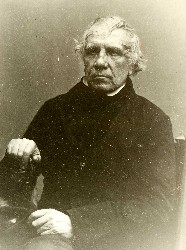
|
SAM BAMFORD
BORN 28TH FEBRUARY, 1788. DIED 13TH APRIL, 1872.
―――♦―――
|
|
TH' owd
veteran brid's toppled deawn fro' his pearch,
He'll charm us no more wi' his singing';
His voice has been hushed i'th' melodious grove,
Wheer feebler voices are ringin'!
He sang in his youth, in his green owd age;
An' he sang when i' monly prime;
Then, loike other warblers, he meaunted aloft,
To a fairer an' sunnier clime.
He sang fifty year sin', ere some o' us brids
Had managed to creep eawt o'th' shell;
An' sweetly an' grandly he poiped i' thoose days,
As th' owd Middletonians can tell!
Unloike other warblers an' songsters o'th' grove,
He ne'er changed his fithers, nor meawted;
For th' lunger he lived, an' th' harder he sung,
An' faster these ornaments spreawted.
He wur dragg'd fro' his nest once, at th' dead-time o'th' neet,
An' him an' his mate had to sever,
But it ne'er made no difference to him—not a bit,
For he sang just as sweetly as ever.
He warbled his notes in his own native shire,
When his pearch wur surreaunded wi' dangers;
An' he ne'er changed his tune when he'rn hurried awa
An' imprisoned 'mongst traitors an' strangers.
Owd Sam seldom flattered wi' owt 'at he wrote,
But for truthfulness allus wur famed;
When he feawnd ther' wur owt needed smitin', he smote,
An' cared nowt whoa praised or whoa blamed.
An' they wur songs, wur his,—not that maudlin' stuff;
Would-be poets spin eawt into rhyme;—
Ther's a genuine ring i' what great men sing,
Summat sweet, summat grand, an' sublime! |
|
|
He warbled when Waugh wur a fledglin' i'th'
nest,
An' had ne'er had a thowt abeawt meauntin';
An' young 'Lijah Rydin's had hardly begun
To give us his "Streams fro' th' owd Fountain."
Th' owd loom heawse i' Middleton rang wi' his notes,
An' his shuttle kept toime to his songs,
Ere he led up his neighbours to famed Peterloo,
To deneaunce what they felt to be wrongs.
He sang when his mate drooped away at his side,
Not a song o' rejoicin' or gladness,
But a low, plaintive dirge, softened deawn an' subdue
Wellin' eawt ov a heart full o' sadness.
He sang, too, when th' spoiler bore off his lone lamb,
Tho' his heart wi' deep sorrow wur riven;
Still he didn't despair, for he'd faith to believe
'At his dear ones had gone up to heaven.
He sang when th' breet sunshine illumined his path,
An' th' fleawers wur o bloomin' areawnd;
An' he sang, too, when th' storm-cleawds coom sweepin'
along,
An' threatened to crush him to th' greawnd.
He sang when his een had grown tearful an' dim,
An' his toppin' had turned thin an' grey;
An' th' muse never left this owd veteran bard,
Till Death coom an' took him away.
Thus he sung till he deed, an' his soul-stirrin' strains,
Never failed to encourage an' bless;
For he loved to rejoice wi' thoose hearts 'at rejoiced,
An' sorrow wi' thoose i' distress.
God bless him, an' iv ther's a spot up aboon,
Wheer dwell th' noble-minded an' pure,
Wheer th' songsters are gathered to strike up a tune,
Th' owd brid's perched amongst 'em we're sure!
Samuel Laycock |
|
|
|
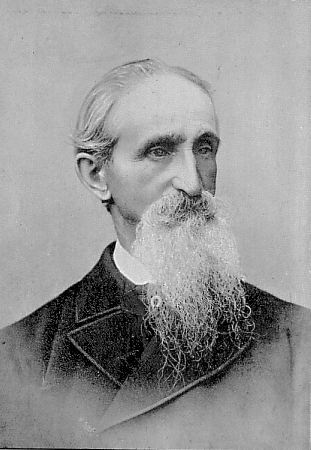 |
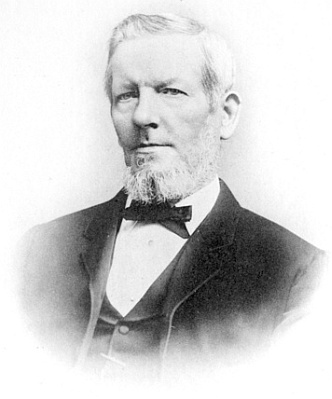 |
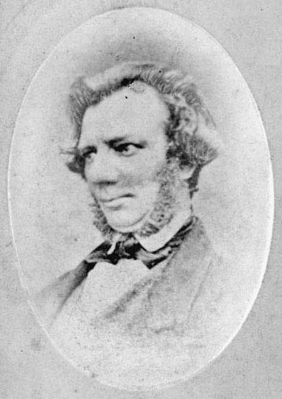 |
|
Samuel Laycock |
Ben Brierley |
John Critchley Prince |
|
THE
POET AT THE
GRAVE OF HIS
CHILD.
The Poet here
alluded to, is my friend Mr. Samuel Bamford, of Middleton, a
gentleman possessing high poetical powers, which, had
they been more
extensively cultivated, would have made him one of the most eminent, if
not the most eminent of our Lancashire Bards. |
|
A
BARD
stood drooping o'er the grave
Where his lost daughter slept,
Where nothing broke the stillness, save
The breeze that round him crept;
And as he plucked the weeds away
That grew above her slumbering clay,
He neither spoke nor wept:
But then he could not all disguise
The sadness looking from his eyes.
Indeed, it was a fitting tomb
For one so young and fair,
Where flowers, as emblems of her bloom,
Scented the summer air.
The primrose told her simple youth,
The violet her modest truth;—
Thus had a father's care
Brought the sweet children of the wild,
To deck the head-stone of his child.
Around that spot of hallowed rest
Grew many a solemn tree,
Where many a wild bird built its nest,
And sung with constant glee;
And hills upreared their mighty forms
Through Summer's light and Winter's storms;
And streams ran fresh and free,
Through many a green and silent vale,
Kept pure by heaven's untainted gale.
I looked upon the furrowed face
Of that heart-breaking sire,
Where I, methought, could plainly trace
The spirit's fading fire;
For he had stemmed the tide of years
In care, captivity, and tears;
And yet he touched the lyre
With cunning and unfailing hand,
For freedom in his native land. |
|
|
But now the darling child he had,
The last and only one,
Which always made his spirit glad,
From earth to heaven had gone,
And left him in his hoary age
To finish life's sad pilgrimage;
And, as he travelled on,
To soothe the sorrows of his mate,
And brood upon his lonely fate.
How oft together did they climb
The steep of Tandle hill,
And pause to pass the pleasant time
Beside the mountain rill;
Then he would read some cherished book
Within some leafy forest nook,
All cool, and green, and still:
Or homeward as they went along,
Sing of his own some artless song.
Such were the well-remembered themes
That told him of the past,
And well- might these recurring dreams
Some shade of sadness cast:
Those hearts whose strong affections cling
Too closely round some blessed thing,
Too often bleed at last,
When Death comes near the stricken heart,
To tear its dearest ties apart.
True Poet! touch thy harp again,
As Was thy wont of yore;
Its voice will charm the sting of pain,
As it hath done before:
Husband, subdue a mother's sorrow,—
Father, expect a brighter morrow,
And nurse thy grief no more;
Man, bow thee to the chastening rod,
And put thy holiest trust in God!
John Critchley Prince |
|
――――♦――――
|
SAMUEL BAMFORD.
BORN FEBRUARY 28TH, 1788. DIED APRIL
13TH, 1872. |
|
THIS day a
warrior bowed his plume, and died;
This day a noble spirit, purified,
Hath pierced the shadows of terrestial night,
And sought enshrinement in the "halls of light."
His was no stagnant life who gives this day
Back to his God a spirit weaned of clay.
For LIBERTY he donned
his mail and casque;
The GODDESS blessing
with a smile his task.
He saw that smile irradiate the world
Ere yet he closed his eyes. Boldly unfurled
He the proud banner when the maid was young
For whom he battled, and whose praise he sung.
Nor fought a braver champion in the field
Where men for freedom bled and died. His shield—
"MY HOME—MY
RIGHT—MANKIND"—the
motto bore,
Which to the last, with sheen undimmed, he wore.
Thick were the blows which rang upon his mail;
Deadly the thrusts that pierced it; but the trail
Of vanquished pennon, and the droop of crest,
His valour brooked not. His a nobler rest.
Five times unhorsed, and dashed upon the field;
Yet called he not for quarter, nor would yield
To foes outnumb'ring. Quick to saddle sprang
He yet again,—again his armour rang.
As falls the storm against the stubborn oak,
So fell upon his breast the battle stroke;
As stands the rock that heeds not flashing sky,
So stood his soul, man's thunder to defy.
And thus contending in that 'sanguined fray,
A victor now, next moment driv'n to bay,
His arm relinquished not its manly thrust
Till lay the foe in ignominious dust.
Then home came he with chaplets on his brow,
To doff his mail and casque. The knightly vow,
To free his country from a galling yoke,
Fulfilled with honour, he his weapon broke.
And in the evening of his life he lay
Watching the closing of a glorious day;
And as the summer's sun sinks in the west,
So sank our hero to his quiet rest.
Peace to thy honoured dust! No lay of mine,
Old soldier! e'er can reach a worth like thine!
Sing thine own requiem in that noble song
Thy life hath writ. Such themes to thee belong.
Ben
Brierley.
April 13th, 1872. |
――――♦――――
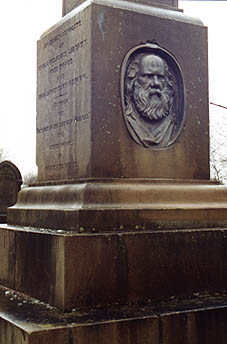
|
The Times.
(22 April, 1872) |
|
THE LATE
SAMUEL BAMFORD.—The
funeral of Samuel Bamford, the Lancashire Radical, and author of the book
entitled Passages in the Life of a Radical, and other works, was
performed on Saturday. Mr. Bamford died at the age of 84 years, on
Saturday 13th inst, at Moston, near Middleton, having been born in
February, 1788. He lived to be a patriarch among Reformers.
His connexion with political life dates from 1816, when he became
secretary of a Hampden Club at Middleton, but at all times was opposed to
physical force movements and violence. Writing his Passages in the Life
of a Radical 30 years ago during the Chartist movement, he warned his
fellow working men against errors committed a quarter of a century before,
when a good many had suffered through the vanity of leaders, as well as
the wickedness of enemies, and counselled them to seek their objects
through honesty and simplicity in a peaceful agitation. Bamford had
good reasons for giving his advice. A stalwart Lancashire weaver, he
had commenced political life determined to follow this course himself,
yet, through attending the meeting at Peterloo, Manchester, which was
intended to be a peaceful meeting to petition for Parliamentary reform and
a repeal of the Corn laws, but ended up in a massacre, he was apprehended
for a breach of the law, convicted, and sentenced to 12 month's
imprisonment. Since the period at which he wrote his book, Mr.
Bamford had lived a quiet and retired life, and through the liberality and
benevolence of a number of private individuals, he was supplied with the
means of passing the last 20 years of his life in comfort, though by no
means luxury. Towards the close of his life he had been made an
honorary member of the Manchester Literary Club, and it was through the
instrumentality of this club club that a committee was formed to honour
him with a public funeral. The Bishop at Manchester was invited to
conduct the funeral service, but was prevented by previous and unavoidable
pre-engagements. Writing to Mr. Haworth, the secretary of the
committee, his lordship says:—"Manchester, April 18,1872.—Sir,—I am
engaged to hold a confirmation of Saturday, the 20th, at 3 o'clock p.m.,
at Stand; so that I cannot take part in the ceremonial to which you invite
me. I am afraid, too, that it may wear too much the form of a
political demonstration for me befittingly to have borne a share in it,
even if I had been disengaged. Not that I consider 'politics' in the
highest sense of the word—an interest in what tends to promote the
commonweal—to be an interest alien from, or contrary to, the proper
functions of a minister of Christ; and I could have cordially united in
honouring the man who wrote Passages in the Life of a Radical, and
who, in that remarkable
book, avowed 'that nation to be the only |
party he would serve' (ii., p.235);
tried to teach the rich and poor, employers and employed, that they had
'been all in error as respects their relevant obligations' (i., 281);
sought to bring all classes together on the basis of mutual sympathy and
co-operation; believed that instead of wishing to create sudden changes
and to overthrow institutions, it were better that ignorance alone were
pulled down' (i., 279); and maintained that self-control and
self-amendment of the individual were the only solid 'basis of all public
reform' (ibid). If I had attended Samuel Bamford's funeral I should
have liked to have heard the last chapter of the first volume of his
memoirs read over his grave. It contains counsels that England seems
to me emphatically to need just now.—I remain, Sir, your faithful servant,
J. MANCHESTER.—Mr. John H. Haworth." The funeral procession entered
Middleton about 4 o'clock on Saturday afternoon, where many thousands of
visitors had collected from the surrounding districts to pay due honour to
the occasion. About 300 or 400 persons preceded the hearse walking
five abreast, after whom came mourning coaches and nearly 40 other
carriages of various descriptions. The church was crowded in every
part, the service being conducted by the Rev. Waldegrave Brewster, the
rector, who, in consequence of the coldness of the weather, read most of
the service within the building. The rector was good enough to
follow the suggestion of Bishop Fraser, by reading various extracts from
Bamford's Life of a Radical. The chapter referred to by his
Lordship is one appealing to working men and Chartists to show no
violence. "Come to thine own bosom and home and there commence a
reform, and let it be immediate and effectual." "It is true that the
middle and upper ranks have scarcely been just towards you; they have not
cultivated that friendship of which you are susceptible, and more worthy
than they. Had they done so you would not have been in the hands you
now are. But you can look above this misdirected pride and pity it.
The rich have been as unfortunate in their ignorance of your worth as you
have in the absence of their friendship. All ranks have been in
error as respects their relative obligations and prejudice has kept them
strangers and apart." The interesting proceedings inside the church
were followed by only a brief ceremony in depositing the coffin in its
last resting place. The church and burial ground being seated on an
eminence immediately overlooking the town, the thousands of people
collected there formed an exceedingly picturesque spectacle as witnessed
from the streets. The weather, though cold, was exceedingly fine,
and the proceedings passed off with the decorum benefiting such a
melancholy occasion. |
――――♦――――
|
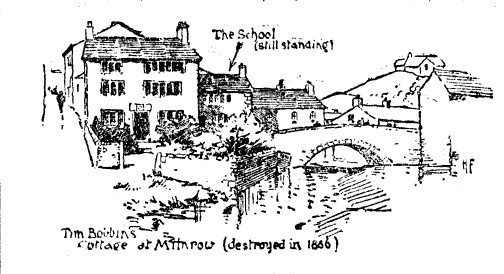 |
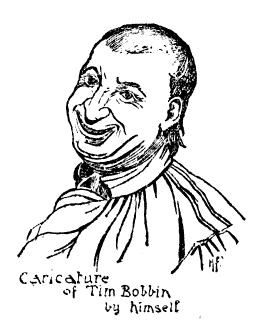 |
|
Tim Bobbin ―
two illustrations appearing in
The Manchester Times, 16th October, 1891. |
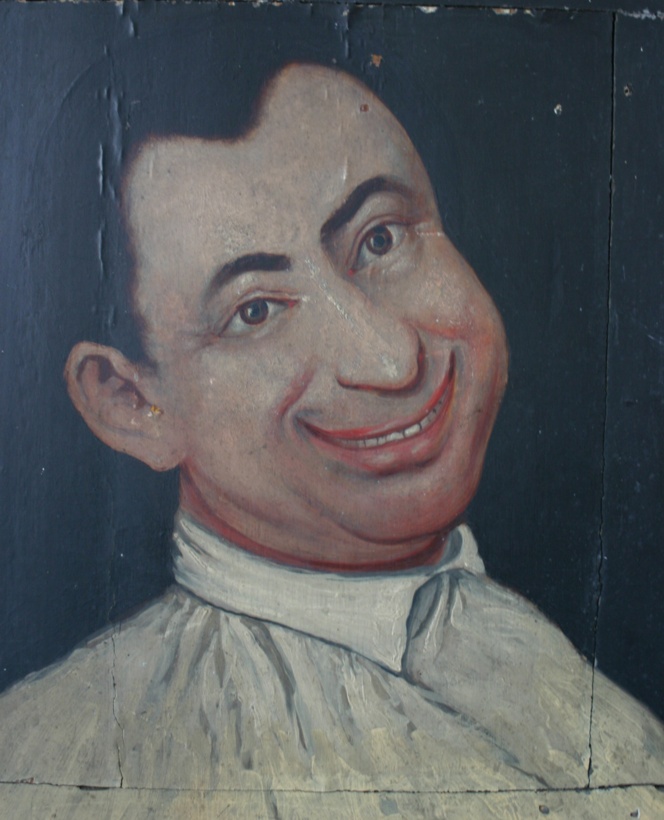 |
|
Painting, oil on board,
identified by the Rochdale Museum and by auctioneers Bonhams
as a self-portrait of
Tim Bobbin.
(By courtesy of David Coomber & Carole Bent,
"Celtic Connection.") |
――――♦――――
|
Manchester City News
19th July, 1924.
SAM BAMFORD.
――――♦――――
Romance of a Man of Action.
By James Middleton. |
|
The literary reputation of Sam Bamford
rests securely upon two autobiographical works that he wrote—one "Early
Days," the other "Passages in the Life of a Radical." The first of
these dealt with his experiences as boy and youth; the second is a record
of his career as a political reformer. These two books made a
notable contribution, not only to Lancashire authorship, but also to
English literature. Of the two "Early Days" is preferable for style,
whilst the "Passages" must be assigned pre-eminence for varied and
sustained interest. The two books are beautifully written in the
purest English and the choicest prose.
Early Adventures.
But whilst he was distinguished as a man of letters, and
dallied with verse, some of it good enough to be called poetry, he was
also a man of action. He was born into a brisk time. His
period might properly be described as Peterloo: Before and After. He
was born at Middleton, near Manchester, in February 1788, and, as he
remarked, he and the world came into trouble together. That so quiet
and remote a place should have found trouble only shows how much trouble
there must have been about. Bobbie Burns and the French Revolution
had put into circulation ideas which disturbed the ordinary rim of things.
The working classes were stirred to a quick interest in their own unhappy
condition. Hampden Clubs were formed: one at Middleton, to which
Bamford was appointed secretary. Into this welter Bamford was born.
It must have been a strange birth, for he says of it, "I was born a
Radical." By that token a stormy career awaited him.
As a boy he was adventurous. There was warm blood in
his veins, which he did not inherit from his mother, for she was a saint.
His father, in early manhood, was as merry a soul as Old King Cole.
He was given to drinking, and in his cups was ever ready to fight.
But the Wesleyans laid hold of him, and he became a changed man and
remained so.
As to the boy, his real adventures began with the music of a
fife and drum and a handful of ribbons. So fascinated was he that he
took the shilling and as much ale as he wanted, and was technically of the
Army. Curiously, he was never called up, and so missed military
service. As the Army failed to claim him he turned his thoughts to
the sea, and signed a contract to serve with a coasting vessel which
traded between South Shields and London. It was a change which
enabled him to see London, with its historical memorials. After
half-a-dozen voyages each way he tired of the life, deserted his ship, and
made for home and Middleton. He walked it. Had it not been for
playing the "old sailor" and dodging the marines and the press-gang
people, might have landed in prison even earlier than he did.
The Young Radical.
Being "born a Radical," he began to associate with people of
that order. The Hampden Society hired a chapel where regular
meetings were held. The members were concerned with such ordinary
things as an extension of the franchise and a change in the system of
parliamentary representation. The authorities, with the impulsive
timidity of autocratic governments, became alarmed, suspended the Habeas
Corpus Act, and forbade the holding of public meetings. This was a
challenge which the mildest reformer was bound to take up. Secret
meetings were held, sometimes in the dells of Tandle Hill late at night or
very early in the morning. There were drillings and marchings, and
pikes were to be seen. Bamford went in and out amongst these
preparations, exercising a restraining influence upon the people.
There were secret societies and spies, and plots. One day a young
man, a stranger, came to see Bamford to tell him that a plot was on foot
to make a Moscow of Manchester that night by burning it to the ground.
A light would shine in the heavens as the signal to all the surrounding
districts to march straight to |
the city and take their due allocation. The young man
was sent away, and Bamford and old "Dr." Healey went to sleep at a
neighbour's house in preparation for an alibi. There was no light in
the heavens except a harmless round-faced moon. These were
adventures in which Bamford would not join.
In Prison.
But all his precautions did not save him from the attentions
of the authorities. Nadin, the head of the police, came in the
night, arrested him in his own house, and carried him off in irons to "The
Tribulatory," which was Bamford's name for the Salford gaol. He was
taken to London; brought up at Bow-street, remanded to Lord Sidmouth, Lord
Castlereagh, and the Privy Council. A second appearance before the
Council followed. Bamford acknowledged that he was a parliamentary
reformer, and always should be so until that measure was obtained; that no
circumstance or situation whatever would induce him to disavow his
opinions, and that he considered it the glory of his life to have merited
the name of a reformer, but had never advocated its obtainment by
violence. After five examinations Bamford was discharged on his own
recognisances.
Peterloo and Afterwards.
Then Peterloo occurred, with its cuts and bruises inflicted
by the swords of the yeomanry. Bamford was present as leader of the
Middleton contingent. That was enough for Nadin. The police
banged on Bamford's door, which was opened when they said who they were
and what they wanted. They entered the dark room, police and
soldiers. The drawers were rummaged, his box was explored, and all
his books and papers were tumbled into a shawl, to be carried away.
Handcuffs were ordered and put on. This is how Bamford describes the
scene:—
The order was given to move; my wife burst into tears. I tried to
console her: said I should soon be with her again. I ascended into
the street, and shouted "Hunt and liberty." "Hunt and liberty"
responded my brave little helpmate, whose spirit was now roused. One
of the policemen, with a Pistol in his hand, swearing a deep oath, said he
would blow out her brains if she shouted again." Blow away was the
reply. "Hunt and liberty." "Hunt for ever."
The woman's brains remained in their proper place, the
procession moved off, and Bamford the Reformist was on his way to gaol
again.
This time he found himself a prisoner in Lincoln Castle,
where he became came seriously ill. His wife was allowed to visit
him, and a room was set apart for their joint accommodation. At the
end of the agreed period she returned to Middleton, but as Bamford's
health grew worse she returned to Lincoln Castle to nurse him back to
health. Under her wifely treatment he soon recovered his wonted
strength. When the term of his twelve months' imprisonment ended he
was released, and once more recognisances of rood behaviour were entered
into. Then it was the open street of a cathedral city, and after
that the open country. They were a long way from home, means of
travel were not plentiful; but Bamford and his wife were young and of a
cheerful spirit. They started to walk home.
It was in the merry month of May, and the weather appears to
have been bright and sunny. They passed through some of the most
beautiful parts of our lovely country. As they crossed, the wold
near the Yorkshire border they saw "the wind of heaven—the spirit of life"
They were only thirty three years of age, and all the toil and suffering
they had passed through all there was of endeavour and achievement, had
been accomplished within about fifteen years. Bamford had still his
autobiography to write and of it he made a wonderful story of love and
adventure. |
――――♦――――
|
TIM BOBBIN' GRAVE. |
|
I stoode beside Tim Bobbin' grave
'At looks o'er Ratchda' teawn;
An' th' owd lad 'woke within his yerth,
An' sed, "Wheer arto' beawn?"
"Awm gooin' into th' Packer-street,
As far as th' Gowden Bell;
To taste o' Daniel's Kesmus ale."
TIM.—"I cud like o saup mysel'."
"An' by this hont o' my reet arm,
If fro' that hole theaw'll reawk,
Theaw'st have o saup o'th' best breawn ale
'At ever lips did seawk."
The greawnd it sturr'd beneath my feet,
An' then I yerd o groan;
He shook the dust fro' off his skull,
An' rowlt away the stone.
I brought him op o deep breawn jug,
'At o gallon did contain;
An' he took it at one blessed draught,
An' laid him deawn again!
Sam Bamford. |
――――♦――――
|
Manchester City News.
22nd August 1925.
The Home at Charlestown.
――――♦―――― |
|
MR. JOSHUA HOLDEN
writes:—I believe I am correct in stating that Bamford wrote both
"Passages in the Life of a Radical" and "Early Days" while residing in a
little cottage in Charlestown, Blackley. Part of this hamlet still
remains, but the cottage in which Bamford lived has long ago disappeared.
A steep hill, much steeper than the present Charlestown Road, led from the
turnpike road up to Charlestown.
Bamford's cottage was the last on the right, and immediately
behind was a deep dell in which was a fern-festooned well, which never
failed in its supply. This dell now forms part of Boggart Hole
Clough. It was from this cottage, seventy-three years age, that
Bamford, at the age of sixty-four, went to London to take up an
appointment in Somerset House. He soon tired of his appointment and
pined for his old environments.
It was probably while sitting on one of the forms in a London
park that he wrote or conceived the idea, for his "Farewell to My
Cottage." In the London park, he sees strange children, and compares
them with those who loved him and Mima, and who did so many little acts of
kindness for them. Proctor, in "Memorials of Bygone Manchester,"
refers to this poem, and says that it was probably the last which Bamford
wrote. He also states that Bamford once expressed a desire that the
verses should be appended to a picture of his dwelling near "Boggart-Ho-Kloof."
This has never been done.
I enclose a copy, of the poem, and also a photograph of Charlestown
showing Bamford's cottage. I am looking forward, and doubtless many
others, to reading the "Looms of Destiny," for it would be difficult to
find a more varied life than that of Samuel Bamford for the groundwork of
a good story.
|
――――♦――――
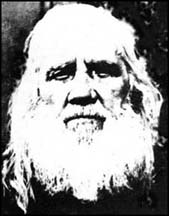
|
FAREWELL TO MY COTTAGE. |
|
FAREWELL to my cottage, that stands on the
hill,
To valleys and fields where I wander'd at will,
And met early spring with her buskin of dew,
As o'er the wild heather a joyance she threw;
'Mid fitful sun beamings, with bosom snow-fair,
And showers in the gleamings, and wind-beaten hair,
She smil'd on my cottage, and buddings of green
On elder and hawthorn and woodbine were seen—
The crocus came forth with its lilac and gold,
And fair maiden snowdrop stood pale in the cold—
The primrose peep'd coyly from under the thorn,
And blithe look'd my cottage on that happy morn.
But spring pass'd away, and the pleasure was o'er,
And I left my cottage to claim it no more.
Farewell to my cottage—afar must I
roam,
No longer a cottage, no longer a home.
For broad must be earned, though my Cob I resign;
Since what I enjoy shall with honour be mine;
So up to the great city I must depart,
With boding of mind and a pang at my heart.
Here all seemeth strange, as if foreign the land,
A place and a people I don't understand;
And as from the latter I turn me away,
I think of old neighbours now lost, well-a-day,
I think of my cottage full many a time,
A nest among flowers at midsummer prime;
With sweet pink, and white rock, and bonny rose
bower,
And honeybine garland o'er window and door;
As prim as a bride ere the revels begin,
And white as a lily without and within.
Could I but have tarried, contented I'd been,
Nor envied the palace of lady the queen.
And oft at my gate happy children would play,
Or sent on an errand well pleased were they;
A pitcher of water to fetch from the spring,
Or wind-broken wood from my garden to bring;
On any commission they'd hasten with glee,
Delighted when serving clear Ima or me—
For I was their "uncle," and "gronny" was she.
And then as a recompense sure if not soon,
They'd get a sweet posy on Sunday forenoon,
Or handful of fruit would their willing hearts cheer;
I miss the dear children—none like
them are here,
Though offspring as lovely as mother e'er bore
At eve in the park I can count by the score.
But these are not ours—of a stranger
they're shy,
So I can but bless them as passing them by;
When ceasing their play my emotion to scan,
I dare say they wonder "what moves the old man."
Of ours, some have gone in their white coffin shroud,
And some have been lost in the world and its crowd;
One only remains, the last bird in the nest,
Our own little grandchild, the dearest and best.
But vain to regret, though we cannot subdue
The feelings to nature and sympathy true,
Endurance with patience must bear the strong part—
Sustain when they cannot give peace to the heart;
Till life with its yearnings and struggles is o'er,
And I shall remember my cottage no more.
Sam Bamford. |
――――♦――――

<>
|